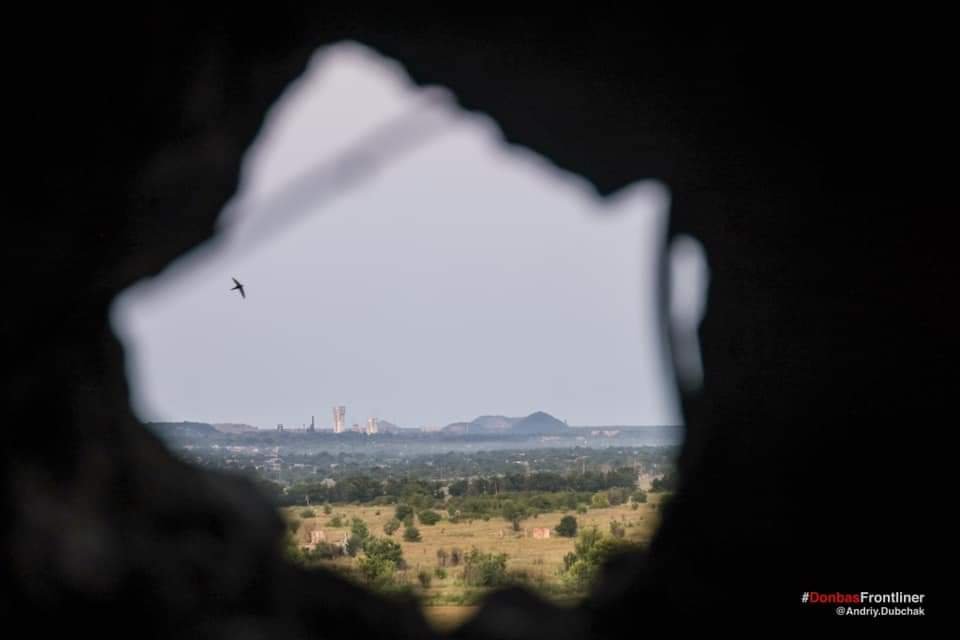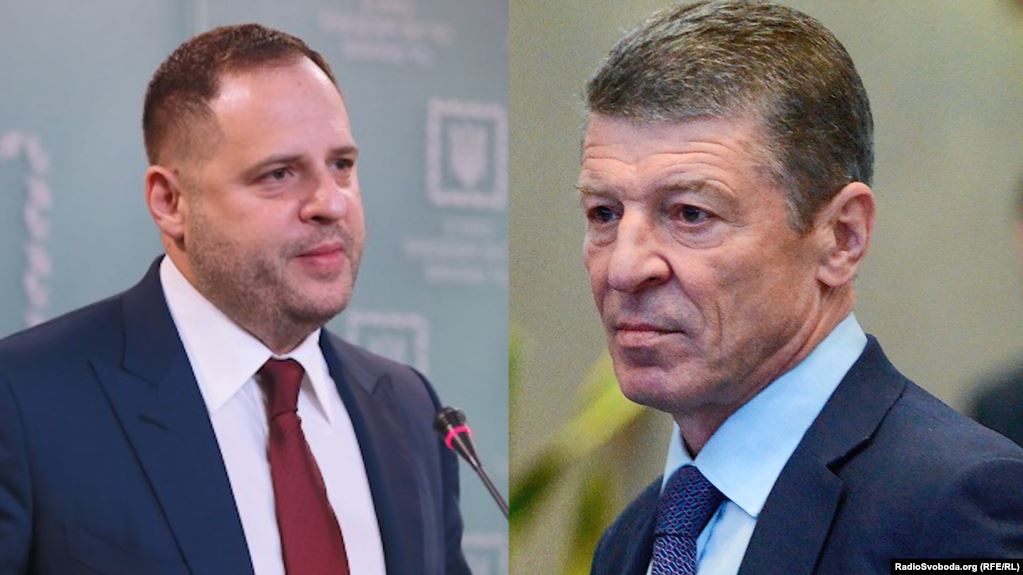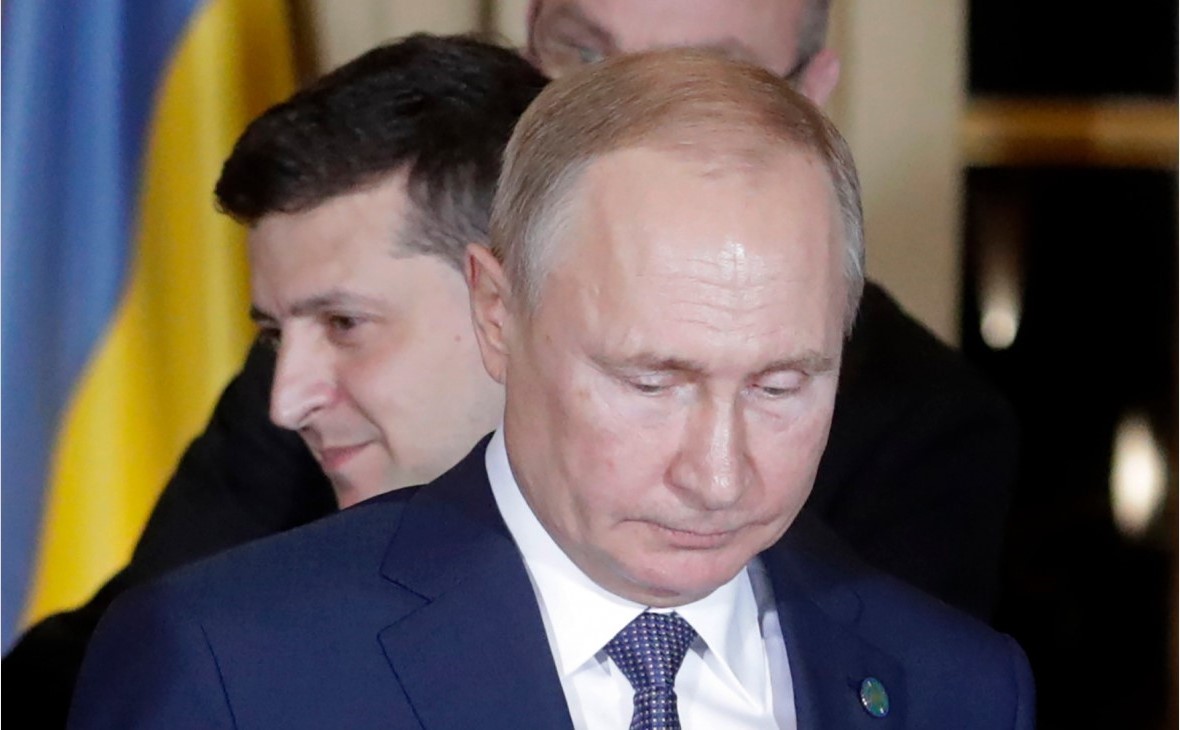On 3 August, the press center of the Kyiv-based Ukrainian Crisis Media Center hosted the presentation of the monograph “The Future of the Donbas according to the Steinmeier Formula.”
In his book, legal expert Yuri Shulipa reveals the gist of the possible consequences for Ukraine if the country would bring into force the infamous Steinmeier Formula, something that Germany and France are pushing Ukraine to incorporate in the state legislature, suggesting it may resolve the conflict in the east of Ukraine, where the Russian forces have been in control of parts of two oblasts since 2014.
“The findings of the study show that in the course of further implementation of the ‘Steinmeier Formula’ and the Minsk agreements, a situation of loss of the control of the state may arise, inspired by both external and internal enemy aggressive forces,” the study reads based on the judicial analysis of the Formula.
In the course of the presentation, Yuriy Shulipa stressed that the introduction of the Formula and other similar proposals could lead to the loss of Ukraine’s subjectivity in the international arena.
“The insistence on implementing the Steinmeier Formula is a direct interference in Ukraine’s internal affairs. This is Putin’s initiative, which he is trying to sell with the help of his international colleagues,” Mr. Shulipa said.
“This is a special research study, devoted to the problems of war and peace in Ukraine, intended for specialists in the field of national security and defense. The problem of resolving the armed conflict, which is raised in the book, will be relevant for a long time to come,” said lawyer Natalia Tselovalnichenko, leader of the Luhansk Human Rights Group at the presentation of the study.
The Steinmeier Formula
The so-called Steinmeier formula is an idea voiced by then German Foreign Minister (2013-2017) Frank-Walter Steinmeier in fall 2015 Then, it became clear that the two Minsk accords, drawn up by Germany, France, Russia, and Ukraine in fall 2014 and winter 2015, were stagnating and did not yield a rapid resolution to the war in eastern Ukraine due to a conflict of interpretations. Ukraine insists that any attempt at political resolution should come after Ukraine establishes control of the territory while Russia pushes to inscribe the separate political status for ORDLO, areas of Eastern Ukraine under control of Russian-separatist forces, before this happens.
The Steinmeier formula envisions that if OSCE monitors verified that the elections in ORDLO were held without violations, then the “law on special status” giving autonomy to these areas would come into immediate effect. If the formula would be applied before the withdrawal of Russian hybrid troops and Ukraine’s control of the Russian-Ukrainian border, Ukraine would de-facto recognize the occupation authorities and their sovereignty over ORDLO.
Can Zelenskyy “stop the war in Donbas” and how will the Steinmeier formula affect Ukraine? An FAQ

In 2019, when then newly-elected President Volodymyr Zelenskyy was leaning towards adopting the Steinmeier Formula as a way to resolve the situation in the Donbas, multiple protests hit Ukraine as many saw that intended step as Ukraine’s capitulation to Russia.
Protests against “Steinmeier’s formula” gather largest crowd since Euromaidan
Now, having analyzed the potential challenges posed by the foreign policy of the Russian Federation, Shulipa’s monograph concludes that incorporating the Steinmeier Formula into Ukrainian legislation is “incompatible with the geopolitical existence of Ukraine as an independent state and a subject of international law.”
Making the Formula a part of the Ukrainian legislature, according to the study, would lead to:
- a de-facto refusal to recognize security as the highest social value in Ukraine contrary to the Constitution;
- adverse consequences linked to the inability of the state to fulfill its legislative obligations to ensure military, public, and state security, again contrary to the Constitution and the law “On the National Security of Ukraine.”
Besides causing damage to the interests of Ukraine’s national security, economy, and the legal system – which was analyzed throughout the book, the author argues that adopting the Steinmeier Formula can cause a significant deterioration in the socio-political situation in the European Union, at least in the terms of a significant increase in the flow of refugees from Ukraine.
Moreover, the study says, undermining the sovereignty of Ukraine could lead to the onset of the so-called “parade of sovereignties,” the emergence of various local internal conflicts instigated by Russian agents, the relocation of the theater of operations to territories free from Russian occupation, and ultimately to the temporary disappearance of Ukraine as a subject of international law.
Not only the Steinmeier Formula but also Minsk accords should be disowned, study suggests
The author of the monograph argues that
“compliance with the terms of the Minsk accords by the armed forces and law enforcement agencies of Ukraine made it possible for Russia to establish an occupation regime for the temporarily occupied territories of ORDLO and subsequently integrate them into the Russian military, economic, information space.”
While the Ukrainian leadership keeps repeating that there are no alternatives to the Minsk agreements, Putin shows no intention to end the occupation of ORDLO. On the contrary, Russia has been consistently implementing the Kremlin’s strategy of destroying Ukraine as a subject of international law.
However, the documents were never ratified by the Ukrainian parliament, moreover, were signed by a former president without powers to sign international agreements. What is more, several paragraphs made it virtually impossible to fulfill the deal by both Russia and Ukraine, bringing the situation in the Donbas to an ongoing stalemate that has been lasting for seven years now.
“Acting within the paradigm of the Minsk agreements, the Normandy format, and the Steinmeier Formula, Ukraine continues Russia’s foreign policy aimed at destroying Ukraine as a subject of international law,” the study concludes.
The author believes that the Ukrainian president and his office need to
“gradually move away from the destructive course of the lack of alternatives to the Minsk agreements, imposed by force and blackmail on the previous top political leadership.”
The Budapest Memorandum of 1994 theoretically promised security assurances against threats or use of force against the territorial integrity or political independence of Ukraine, Belarus, and Kazakhstan – the countries which were giving up their nuclear capabilities in exchange for those assurances. The guarantors were the Russian Federation, the United Kingdom, and the United States. However, in 2014 Russia breached the agreement by invading and annexing Ukraine’s Crimea and unleashing the war in Ukraine’s east.
The study suggests that Russia’s occupation of ORDLO (“certain areas of Donetsk and Luhansk oblasts” – an official designation of the Russian-occupied territories in Ukraine’s east) is going to continue at least until one of the following events occur:
- the current Russian political regime is changed.
- Russia’s collapsed, completely or partially.
- Russia finds itself in such an unfavorable economic situation that it would be forced to withdraw from ORDLO.
Recommendations
As any attempts to appease the aggressor by partial surrendering national interests and sovereignty would only increase the incentives to intensify the aggression, the author believes that Ukrainian leaders and society
“should have strategic patience and wait for the change of the Russian political regime, Russia’s complete or partial disintegration, or an onset of a situation when the Kremlin refuses to support ORDLO for economic reasons.”
- Read also: “Ukrainian Doctrine of Security and Peace” proposed as alternative plan to Minsk protocol (2019)
The president is advised not only to lay down an effective foreign policy but also to “formulate a strategic multi-vector plan for the de-occupation and reintegration of ORDLO,” primarily based on Russian realities and a set of symmetric and asymmetric comprehensive measures. The plan should prescribe in detail “various algorithms of actions in case of the onset of certain consequences, or against active opposition from the enemy side.” The Parliament would need to adopt an internal political strategy to ensure security in the country.
The study recommends the Cabinet devise a state program to relocate the citizens who have to live now in the occupied territories of the Donbas and Crimea and also help those already displaced to acquire housing and employment.
The author’s propositions go as far as to suggesting Ukraine to demands on the aggressor country by presenting territorial claims to the territories of Russia’s Bryansk, Belgorod, Voronezh, Kursk, Rostov oblasts, which belonged to Ukraine in 1918-1928 of the last century.
In the author’s opinion, up to the point when the actual de-occupation and reintegration process would begin in ORDLO, the only way to minimize the number of ceasefire violations and Russian provocations along the contact line is to create a demilitarized zone as this measure proved to be working between India and Pakistan, South and North Korea, and in other cases.
Further reading:
- Minsk protocol and “Steinmeier’s formula” – conflict resolution or conflict conclusion?
- The real problem with “Steinmeier’s formula” and the Russo-Ukrainian war
- Donbas negotiations in deadlock again as Russia demands local elections again
- New Ukraine ceasefire agreement officializes Donetsk-Luhansk militaries (2020)
- The quick way to quasi-recognition of Donetsk-Luhansk’s armed formations: a play-by-play account
- Minsk-2 is the real problem for Ukraine, not “Steinmeier’s formula” | Infographics
- “Ukrainian Doctrine of Security and Peace” proposed as alternative plan to Minsk protocol (2019)
- Ukrainian opposition to “Steinmeier formula” capitulation is nationwide
- The “Steinmeier Formula”: Zelenskyy’s huge mistake
- Can Zelenskyy “stop the war in Donbas” and how will the Steinmeier formula affect Ukraine? An FAQ
- Protests against Steinmeier’s formula spread in Ukraine, “movement against capitulation” founded (2019)
- Protests against “Steinmeier’s formula” gather largest crowd since Euromaidan (2019)
- Everything you wanted to know about the Minsk peace deal, but were afraid to ask








